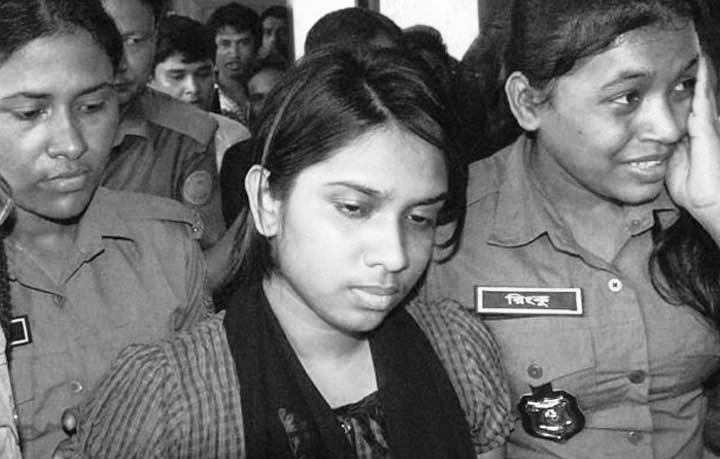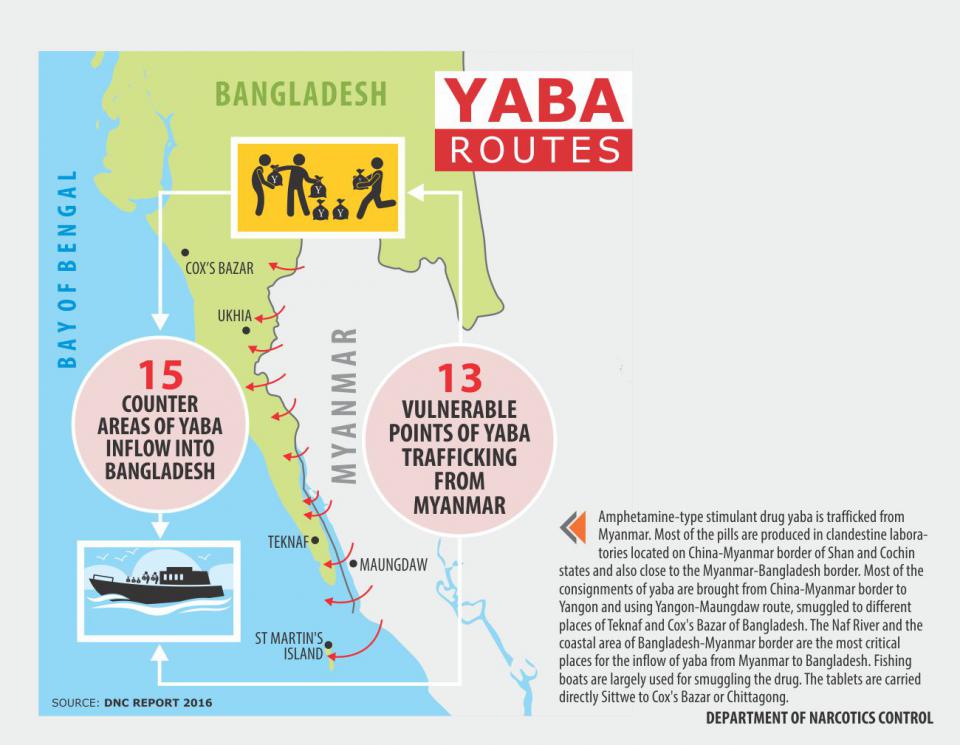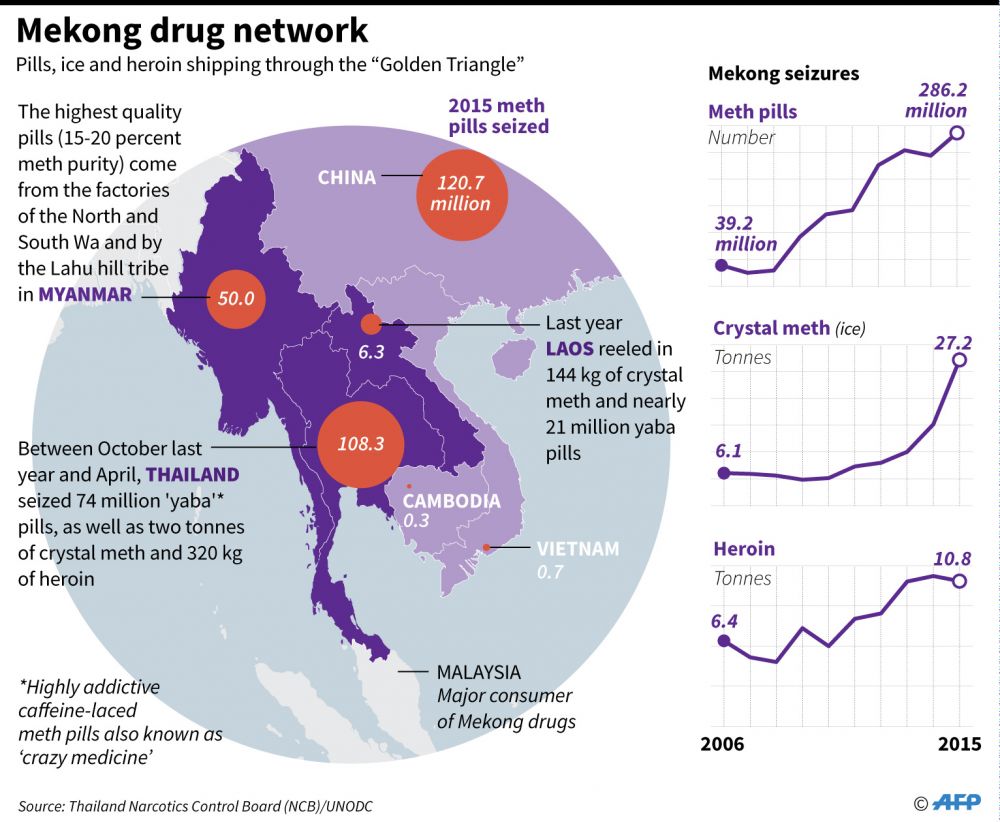Yaba Grips Bangladesh in a Chokehold
IT’S now a national crisis. The influx of deadly yaba appears to have gone beyond control despite efforts by law enforcement agencies to contain it. In 2006, only the rich kids were using the colorful pills, known as yaba, when they first began circulating in Dhaka, the Bangladeshi capital. Today, yaba is everywhere.
Yaba which loosely translate to “crazy medicine” (in Thai language) is available everywhere — from the capital city to remote villages, from slums to posh areas. It has penetrated the society’s all strata — students and professionals, the poor and the rich. Yaba is a combination of methamphetamine and caffeine. They are candy like tablets that come in different flavors, and bright colors. Users typically heat the tablet, which sits on aluminum foil, and then inhale the vapors from the melting tablets. Others crush the tablets into powder and snort them.
Yaba is destroying the young people of Bangladesh
In 2013, Oishee Rahman was a 17-year-old addicted to yaba. Her parents worried about their wayward daughter so they confiscated her phone and confined her to their Dhaka apartment. Angry, she mixed their coffee with sedatives.
Rahman watched their heads nod into sleep. Then she took a kitchen knife and stabbed them both to death. She locked her younger brother in the bathroom and called a friend to pick her up. She later handed herself in to police, and allegedly confessed.
Rahman was sentenced to death in November 2015. In its verdict, the court said Rahman had “planned the murder well ahead.” She was 19 years old at the time.
In June of this year, a Dhaka High Court commuted Rahman’s death sentence to life in prison, having taken into account her age and her mental health. Her case was a lightning rod for the anxiety Bangladeshis feel about yaba use among young people, with many commentators blaming the drug for warping Rahman’s mind.
Over 52 per cent of the population falls in the age bracket of 15 to 35 and it is the same prime group that is now getting addicted to the deadly drug, which gives them temporary happiness but in the long run destroys them both psychologically and physically. It causes anxiety and aggression and damages kidney, heart, liver and brain as well.
Yaba pills typically contain methamphetamine, caffeine and non-active bulking agents. It creates a hyper-alert state of rushing energy. “It has a vanilla smell and the smoke tastes like I can’t explain,” said Rafi. “First there is a warm feeling in your chest and then you get this rush.”
Rafi, who says he’s been clean for several years, first started taking the drug when he was a DJ in Dhaka, it helped him stay up all night. As his addiction progressed, he cared less about socializing and preferred to just get high with his friend.
Rafi described a typical day when he was at the height of his addiction, consuming up to four powerful pills a day. “I used to wake up at 9 or 10 a.m. after forcing myself to sleep for a few hours, smoke yaba and head to work and arrive severely late.”
According to the Dhaka Tribune, a single R7 pill costs up to 900 taka ($11). A cheaper version, called “Pink Champa,” goes for about 300 taka ($3.7). The strongest brand, known as “Controller,” costs up to 2,000 taka ($25).
Yaba first appeared among the Bangladeshi elites, people who the rest of the population aspired to be like.
“Yaba became a symbol of smartness, fashion and aristocracy. Model girls, film heroines, singers, dancers and many of the celebrities became a subject of media reports for abusing yaba,” said the DNC report.
Yaba addiction in Bangladesh police
“As a police officer, I am very worried that even my force members are getting addicted to yaba. It is a huge problem …. There is no profession that yaba has not infiltrated.”
Stressing the need for containing yaba inflow right at the border, he said the drug crosses over into Bangladesh in small number of consignments and then spreads across the country in lakhs of smaller consignments.
“It gets very difficult to seize yaba once it spreads out. So we have to stop it at the border,” suggested the additional IGP.
Lt Col Mahfuzer Rahman, director (operation) of the BGB, showed a photographic documentation which depicted vivid examples of yaba peddling.
It shows the tablets are carried in mobile phones, secret chambers in cars, trucks or motorcycles, fuel tanks of bikes and even inside holy books. Carriers swallow capsules containing the pills and also hide those inside rectum.
Major hurdles in implementing Law & Order
Though the additional IGP spoke for checking yaba at border point, the task is not easy due to some major hurdles including non-cooperation of Myanmar, the main source of the mad drug (yaba literally means mad drug).
The BGB cannot interact with its Myanmar counterpart very well as the latter responds to one in 10 calls. The Myanmar side cannot be reached at all in some bordering areas where the country’s army is deployed, said Lt Col Mahfuzer.
There is no fencing in the border with Myanmar and it is very difficult to patrol 10km of it by a team consisting of only six members. Smugglers can pass yaba in between movements of the force members from one place to other, he added.
“We are very worried as we cannot make the graph [of yaba seizure] nosedive. In cases of other drugs, the graph sometimes goes up and sometimes down, but for yaba it is always upward. It is really alarming that it is going out of control.”
He mentioned that incidents of smuggling through Indian border went down following fencing of 70 per cent of the boundary. “There is no alternative to fencing the border.”
Bangladesh and Myanmar share a 270km border, much of it is along the River Naf. Every day, some three lakh vessels of different kinds, beginning from small wooden boat to trawlers, ply this waterway.
To stop entry through borders, Captain M Ikram Hossain, director (operations) of Bangladesh Coast Guard, suggested a ban on fishing in the River Naf at night and tourism in St Martin’s Island in April-May.
He stressed the need for breaking away from regular legal procedure, at least for an interim period, to tackle a crime of this nature. “Like the Philippines, we may introduce a model of very tough and instant punishment.”
Captain Ikram said the Coast Guard is very understaffed. The force has 2,500 staff on deputation from Bangladesh Navy. Only seven to eight staff are posted at each station.
He also said they have no female staff to search female carriers who conceal yaba pills inside their vagina and anal cavity.
DNC Director Md Nuruzzaman Sharif said due to loopholes in the existing law, the accused in drug cases are coming out of jail on bail.
He said the amendment to the Narcotics Control Act 2019 removing the loopholes and increasing punishment is at the final stage.
Mukul Jyoti Chakma, DNC’s deputy director (Dhaka Metro), said last year they arrested 11,000 people in narcotics cases, but only five per cent of them are now in jail. Most of the listed traders are out on bail.
He said the DNC is understaffed and not adequately equipped with arms, equipment and technology. He demanded the power of mobile tracking.
Rohingya refugees are mostly full-time fisherman and part-time yaba drug smugglers
The BGB director said the refugee camps in Teknaf have turned into a drug zone where clashes are on the rise over money, narcotic and illicit relations.
He said apart from the Myanmar, some consignments of yaba pills are being smuggled into the country through Indian border. The BGB seized around 1,800 pieces in the border with India in 2013 while the number was 1.1 lakh in 2015 and 67,000 in first four months of this year.
The participants said they have a list of yaba godfathers, but they cannot take any legal action as they have to go though legal procedure. They suggested the media should do investigative reporting to unmask the godfathers.
SOURCE : The Daily Star/Bangladesh



